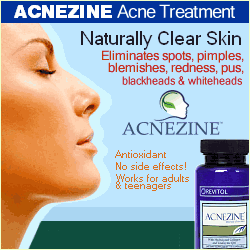Acne and Diet - Insulin, Insulin Resistance, and Hormones
Diet, though not a direct cause of acne, does have an indirect effect on acne. That is why so many 'acne cures' recommend dietary changes in conjunction with whatever else they are advocating.
Because diet has an indirect effect on acne, individuals will get variable results when changing what they eat. This is because we all metabolize foods differently. Some people may be more sensitive to certain foods, and so those foods will have a greater impact on their acne than others that don't have those metabolic issues.
For example, skin with a tendency for acne has been shown to be insulin resistant. Insulin is a hormone that regulates carbohydrate metabolism, as well as playing a role in protein metabolism and fat metabolism. Insulin regulates the way our cells use the available energy in the bloodstream - so insulin makes the liver and fat cells (adipose tissue) take in some of the glucose in the bloodstream and stores it as fat.
People with insulin resistance don't respond to the normal amounts of insulin released in the body. Because the regulation of blood glucose levels (which insulin ultimately is responsible for) is so important, the pancreas starts producing more insulin when the liver and fat cells don't respond. Blood glucose levels can build up if the body still doesn't respond.
High levels of insulin can cause high blood pressure, fluid retention, and can lead to type 2 diabetes.
Thus, for those with insulin resistance, poor quality carbohydrates such as white bread, sugar, and sugary foods, may be a problem. These types of carbohydrates are digested quickly and enter the blood stream rapidly. Normally, insulin would trigger the body removing those excess blood sugars into cells. But with insulin resistance, they hang around longer in the blood, as well as causing the body to have high levels of insulin in the blood.
This is important for acne sufferers, particularly women, in that excess insulin can cause higher levels of male hormones. These androgen hormones have long been implicated in acne. They increase the oil production of the sebaceous glands, which leads to clogged pores and provides a breeding ground for the acne bacteria.
In another study, researchers implicate the high levels of refined carbohydrates (such as bread and cereals) in teenage acne. Following a similar rationale, they suggest that high levels of blood sugars increase the levels of insulin and insulin-like growth factor (IGF-1), which leads to excess production of male hormones. These male hormones then trigger acne outbreaks.
And as well as that, insulin-like growth factor (IGF-1) encourages certain skin cells (keratinocytes) to increase. Keratinocytes are also implicated in acne.
Click here for detail











0 comments:
Post a Comment